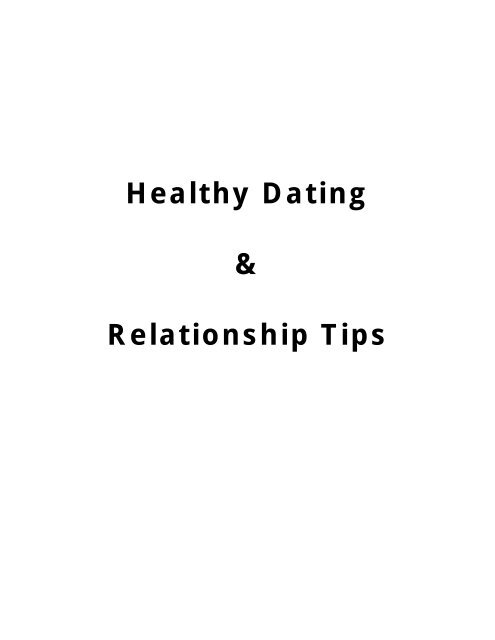Healthy Dating & Relationship Tips - Peterjasie
Healthy Dating & Relationship Tips - Peterjasie
Healthy Dating & Relationship Tips - Peterjasie
- No tags were found...
You also want an ePaper? Increase the reach of your titles
YUMPU automatically turns print PDFs into web optimized ePapers that Google loves.
Proposed Table of ContentsIntroduction To <strong>Relationship</strong>sBack to Basics: Body Language BriefingABC’s of <strong>Healthy</strong>, Happy <strong>Relationship</strong>sABC’s of Unhealthy, Sad <strong>Relationship</strong>s<strong>Dating</strong> & <strong>Relationship</strong> Resources<strong>Dating</strong> & <strong>Relationship</strong> <strong>Tips</strong>Online <strong>Dating</strong>Lowdown on Long Lasting LoveSelf-Help GuideAddendum: Generic Budget Worksheet
<strong>Relationship</strong>s.Note that the contents here are not presented from a medicalpractitioner, and that any and all health care planning should be madeunder the guidance of your own medical and health practitioners. Thecontent within only presents an overview of <strong>Dating</strong> and <strong>Relationship</strong>sresearch for educational purposes and does not replace medical advicefrom a professional physician.Back to BasicsLet’s take a peak at some of the more common concepts above“love” relationships and see if they are myths or based upon reality.“All we need is love.” Myth or not? Since love does seem to beable to overcome anything and everything, at least on television andat the movies, this seems like a reality. However, truth is, makingrelationships work takes skill and hard work, regardless of the “love”factor. This is a myth here.Just like in fairy tales, once true love is found, people livehappily ever after. Truth or myth? Granted couples can look into eachother’s eyes and have those warm fuzzy feelings. However, truth is, allcouples will have their ups and downs. “Happily ever after” seems toimply a perfect, problem-less relationship when in reality, those don’texist.
It has to be “love at first sight” in order to work long-term. Mythor truth? While this can be true for some, it certainly doesn’t have tobe for all couples in long-term relationships. Many people growtogether over time.Since practically anyone can learn the nuts and bolts ofrelationship building, focusing on some basic techniques that can belearned is a must. The main ones, in no particular order, are:- Read: “Read” people well.- Rapport: Develop rapport with others well.- Finesse: Have some finesse; i.e. handle conversations andactivities in a cordial manner- Conflict Resolution: Resolve negative issues and conflicts withouttoo much friction- Support Co-Op: Gain the support and cooperation in workingtowards a common goalLet’s take a little closer look at each and what learning is involved.READING PEOPLE: BODY LANGUAGE BRIEFINGBody language is the meaning behind the words or the“unspoken” language. Surprisingly, studies show that only up to anestimated 10 percent of our communication is verbal. The majority ofthe rest of communication is unspoken. This unspoken language isn’trocket science. However, there are some generalizations or basicinterpretations that can be applied to help with the understanding ortranslating of these unspoken meanings. Here are some basics below.
Smile – People like warm smiles. Think of a heartfelt warm-fussy,maybe your favorite pet, and smile.Eyes - -If you don’t look someone in the eyes while speaking, this canbe interpreted as dishonesty or hiding something. Likewise, shiftingeye movement or rapid changing of focus/direction can translatesimilarly. If more than one person is present in a group, look eachperson in the eye as you speak, slowly turning to face the next personand acknowledge him or her with eye contact as well. Continue on sothat each person has felt your warm, trusting glance. Some suggestbeginning with one person and moving clockwise around the group sothat no one is missed, and so that you are not darting around,seemingly glaring at people.Attention Span / Attitude – Other people can tell what type attitudeyou have by your attention span. If you quickly lose focus of the otherperson and what is being said, and if your attention span wanders, thisshows through and makes you seem disinterested, bored, possiblyeven uncaring.Attention Direction – If you sit or stand so that you are blockinganother in the party, say someone is behind you, this can beinterpreted as rude or thoughtless. So be sure to turn so that everyoneis included in the conversation or angle of view, or turn gently, at easeand slowly, while talking, so that everyone is incorporated, recognized
and involved in the conversation. Again some suggest the clockwisemovement when working a group.Arms Folded / Legs Crossed– This can be seen as defensive or an endto the conversation. So have arms hang freely or hold a glass of water,a business card or note taking instruments while communicating withothers. Be open with open arms. Note: If you need to cross legs,cross at your ankles and not your knees. Sitting tightly folded up saysthat you are closed to communications.Head Shaking – This is fairly accurate. If people are shaking theirheads while you speak, they are in agreement. If they are shaking,“no,” disagreement reigns in their minds.Space / Distance – On the whole, people like their own personal bodyspace. Give people room and keep out of their space. Entering to closecan be intrusive and viewed as aggressive.Leaning – Sitting or standing, leaning is viewed as interest. In otherwords, an interested listener leans toward the speaker.Note others’ body language – While you are with others, note howtheir bodies read. If a person suddenly folds his arms across his chestand begins shaking his head “no,” you’ve probably lost him. Might trytaking a step back and picking up where the conversation began thisturn for the negative and regroup. It’s all about strategic planning!DEVELOPING RAPPORT
Now let’s take a quick peak at the basics of developing rapportwith others. In a nutshell, what it takes is to ask questions, have apositive, open attitude, encourage an open exchange ofcommunications (both verbal and unspoken), listen to verbal andunspoken communications and share positive feedback. Here are afew details on each step.Ask Questions – Building report is similar to interviewing someone fora job opening or it can be like a reporter seeking information for anarticle. Relax and get to know the other person with a goal of findingcommon ground or things of interest. You can begin by simplycommenting on the other person’s choice of attire, if in person, orabout their computer, if online, and following up with relatedquestions. For example, in person, you could compliment the otherperson on their color choice and or maybe a pin, ring or other piece ofjewelry and ask where it came from. In online communications, youcould compliment the other person’s font, smile faces or whatever theyuse, mention that the communication style seems relaxed and ask ifhe or she writes a lot. Then basically follow up, steering clear of topicsthat could entice or cause arguing, while gradually leading the personto common ground you’d like to discuss.Attitude – have a positive attitude and leave social labels at home (or
in a drawer, if you’re at home). Many people can tell instantly if youhave a negative attitude or if you feel superior. So treat other peopleas you would like to be treated. And give each person a chance.Open Exchange – Do encourage others to share with you. Somepeople are shy, scared or inexperienced in communicating andwelcome an opportunity to share. So both with body language andverbal communication invite an exchange. Face the other person withyour arms open, eyes looking into theirs gently (not glaring orstaring), and encourage a conversation with a warm smile.Listen – Be an active listener. Don’t focus your thoughts on what YOUwill say next. Listen to what the other person is saying and take yourclues from there, while also noting the body language. For example, ifthe other person folds his arms and sounds upset, you may need tochange the subject or let him have some space and distance; maybeeven try approaching him later on and excusing yourself to go make aphone call (of head to the buffet table or somewhere to escape). Onthe other hand, if the other person is leaning towards you, followingyour every word and communicating with your as if you were oldfriends, BINGO. You’ve built rapport!Share – People like compliments. So hand them out freely withoutover doing it. Leaving a nice part of yourself like a compliment is agood memory for the other person to recall - -numerous times. That’s
good rapport. But do be sincere! False compliments aren’t easilydisguised.FUNDAMENTALS OF FINESSEBasically using finesse in handling relationships means usesubtle skill, tact or diplomacy when handling a situation. This doesn’tmean you need to use fancy, flowery phrases or lengthy 10-letterwords or anything. It means focusing on the positive in a friendly way,and not embarrassing the other person.For instance, finesse means not telling a host that he or she hasbody odor or that his or her house is looks and smells like a trashdump. Instead, it means politely excusing yourself upon entering, andinforming the host of an unplanned meeting that came up or familymember who dropped by unexpectedly, and that you wanted to dropby for a quick “Hello” to thank the host for the invitation beforerushing off to your appointment. Keep things simple here, smile andthink, “James Bond” with that English gentleman concept.CONFLICT RESOLUTIONHow do you handle conflicts? If you can put your ego asidepretty much and try to keep friction to a minimum, your relationshipsshould move along fairly smoothly. Where you feel disagreement, ifyou can “agree” to disagree on certain things with the other partyinvolved, that will help, too. In short, conflict resolution means to
pretty much deal with others as you would want them to deal withyou.For example, let’s look at fictitious John and Mary, out on theirfirst date at a restaurant. A drunk man passes by their table andaccidentally spills Mary’s glass of water. John gets upset and sayssomething along the lines of, “That makes me mad! I hate drunks.They should all be put in jail.”Mary, on the other hand, who has an alcoholic father (unknownas this point to John), may feel embarrassed and saddened by John’srevelation and get quiet, giving only brief “yes” or “no” answers fromthat point on.Hopefully, John picks up on this. He can use finesse and conflictresolution and say, “Mary, I’m sorry for my outburst and really didn’tmean that. Actually, a drunk driver caused an accident that I readabout recently, and I’d really like to learn about alcoholism andunderstand it more.”A statement like this could help ease the conversation into amore productive stage. Then instead of having an argument aboutsocial versus addictive drinking and possibly ending or breaking up therelationship because of conflict, the relationship between two peoplecould actually develop a little farther along or deepen. And John andMary could both learn more about each other and broaden their
perspectives in the process.SUPPORT CO-OP<strong>Relationship</strong>s may begin with just two people, but more peopleeventually become involved. Work friends and associates, familymembers, old school chums and various other assorted personsinteract daily, so gaining the support and cooperation in workingtowards a common goal is a plus in relationship building.To put this into perspective, we can look at John and Mary again.If John gets along fine with Mary, but can’t be in a room for 10minutes with her dad or the rest of her family and friends, therelationship will probably eventually bottom out; i.e. not grow.However, if John can help build some type of relationship with themas Mary does, like joining and participating in a holiday mealcelebration, that is a plus and can help build and grow a more solidrelationship.In summary, by learning to use more of these “nuts and bolts”of relationship building, focusing on some of these basic techniquescan help build and grow relationships. More can be learned abouteach technique by simply heading to the local library or typing in thetechnique into your favorite search engine. Forget that, “You can’tteach an old dog new tricks,” saying. We’re not dogs. And humansCAN learn – at any age!
ABC’s of <strong>Healthy</strong>, Happy <strong>Relationship</strong>sFor <strong>Healthy</strong>, Happy <strong>Relationship</strong>s, here are some basic guidelines forreference. They are in alphabetical order only, not order ofimportance.Acceptance – Don’t try to change someone. This is a must. If aperson really wants to change, that person will need to be motivatedand take action. Period. Also regarding acceptance, accept limitations.He is not Superman; you are not Wonder woman. No one is perfect;so do not expect perfection. Accept the little flaws that come with eachperson. You accept theirs; they accept yours. That’s life!Bonding – Bonding with another person generally does take time.Communicate – talk, listen, share the good and the bad, askquestions, compliment instead of nag or insult. In short be a friend;make a friend. That is healthy. If this bonding is lacking, it may meanprofessional help is needed (like a counselor or therapist) or it may betime to move on to healthier relationships.Communications – Be open to the other person. Check judgmentalattitudes at the door. And give chances. Be fair, flexible and friendly. Ifand when things get out of hand and it is your fault, apologize and askforgiveness and move on. Similarly, be acceptable to apologies andgrant forgiveness, too. Life is too short to stay focused on the negativetoo long. No need to deny it; face it, deal with it and move on past it
to improve and strengthen your relationships.Dependable – Be a friend; i.e. be dependable. Things happen fromtime to time and cancellations are a part of life. But on the whole, ifyou say you’ll do something, do it. Take responsibility for your ownactions.Expectations – Movies, romance novels and television shows oftenportray life, especially human relationships, very differently than it isin the real world – this is no secret. How many people really alwayslook like movie stars, have zero health ailments, endless incomewithout hardly ever going to work, fabulous cars and homes, friendsand family who totally adore them and come to their beckon call, nolong-term problems because they all end so quickly, etc.? And whocan battle serious issues like one person having an affair with someoneelse, and wrap the whole storyline up in two hours? Get real. Expect alittle less than the media portray and learn more about humans byjoining the real world scenario.Flexible - Keep a little mystery in the relationship. Juggle yourschedule and invite the other person to a surprise picnic or walk at alocal public park area.Goals - People usually have some goals together over time. Developsome together. Toss what no longer works, what you outgrew or whatmay no longer seem important or is finished. And then inherit or
create new goals. Working toward a common cause like saving for anannual vacation or a new garden area can help people grow together.Health – Take care of your own health and encourage others, too.Even in this day and age of cable television with movies and theInternet available 24 / 7, it’s still amazing the number of people outthere who can’t “Just say no” to unhealthy behaviors like smoking anddrug abuse. Don’t be afraid to share your healthy views and encouragehealthy choices and living.Intimacy – Closeness with a person takes time to develop. Andthere’s more to intimacy than physical contact. Intimacy can mean ahug during a tough time, a smile of encouragement in the face ofadversity and compassion when you least feel like giving. Don’t abuseor take advantage or the other person. And don’t let yourself beabused or taken advantage of. Intimacy takes commitment andsharing.Just say no – You don’t always have to be voiceless or agree withsomeone in a relationship. Be able to say, “No” and be an individual,too.Keep in Touch – Don’t let life separate you too long. With technologytoday, you can stay in touch with cell phones and email. No need tooverdo it and be obsessive and controlling, but do stay in touch off andon throughout the day with quick “Hellos” and “How are things going?”
Lemonade – Make lemonade out of those relationship lemons. And“yes” there will be some, since life is not perfect! For example, whenyour partner is late and you miss a movie date or restaurantreservation, don’t make it a night of terror and destroy what’s leftwhen you finally do get together. Do something else instead, like relaxat home with a video and scented candles, and order subs (andlemonade!)Make the Honeymoon Last – Remember how your felt when youfirst got together? Do those little things that you did at the beginningand make the honeymoon last. Bring home fresh flowers, shut off thetelevision, turn on some music and dance with your mate, complimentyour mate, make dates to go to places you used to frequent (the oldneighborhood pizza parlor, a local drive in, a hotel you went to on yourhoneymoon, etc.)Nuts and Bolts – Don’t focus so much on the “nuts and bolts” of whosaid what, when, how often and why they were wrong…. In otherwords, sometimes during an argument, try losing your memory of whodid what, when and how many times in the past. Instead, humbleyourself, apologize for having messed up and hug your mate!Open – Open windows when doors close. If you feel you’ve beenpushed to the limit and don’t want to try one more time, close thedoor on that angle of the issue. Take a walk, get some ice cream and
cool off (literally). Then return relaxed and refreshed, and open awindow to air differences.Parental Issues - Even the best of relationships deal with someone’spast parental issues from time to time. Counseling can help, yes, butsomething out of the blue can still trigger a parental issue thatsomeone struggles to deal with regardless of age, it seems. In thesecases, just realizing and stating that it’s normal, may never getresolved and is okay to move on, can work wonders – for both parties.Quality – With hectic schedules, quality time is important. So even ifyou can only meet to watch a 30-minute comedy together everyevening, make and keep that date. You’ll probably be especially gladyou did when times get tough and have the wonderful memories tohelp get you by.Respect – Respect not only each other, but each other’s property,friendships, time, job and …everything. Remember you are sharing lifetogether and need to be courteous to one another and all the affectsyou.Sharing – Likewise share and don’t be stingy. “You reap what yousow,” and “You can’t take it with you” when you die, as the sayingsgo.Trust – <strong>Healthy</strong> relationships involve people who trust one another.One person doesn’t get involved in unhealthy risks with a third party
or lie to the other. There is an open, positive exchange of trust. So ifthis is lacking, seek help from a professional counselor, if necessary,and see what’s wrong.Understanding – Happy, healthy couples try to understand eachother even if it means joining a self-help group, reading library booksabout something foreign or unknown, or taking time to research anddelve into an issue. In other words, take time to gain knowledge andwisdom before jumping the gun on something you may not reallyunderstand.Violence – Violence is not welcome. Period. Don’t accept it. Don’t dishit out. Anger Management is not just a movie term today. There reallyis help out there if you or your mate needs it.Warning Signs – <strong>Healthy</strong> people are generally alert to warning signsof trouble and head them. Denial isn’t part of their life.X-Ray – Happy people in healthy relationships generally don’t look ateach other as they look at x-rays. They don’t see close-ups of eachflaw and character make up. They learn to look beyond the bareessentials and see the whole person.Youthful Attitude – A youthful attitude can go far in relationships.Old outlooks can spawn resentment, skepticism and other negativeconnotations. A little dose of daily humor (reading comics, watching orlistening to comedy, etc.) and keeping in touch with youth (church
activities, neighborhood / social nonprofit functions and events, etc.)can help maintain a fresh, youthful outlook.Zombie – Don’t go through life like you’re a zombie! It’s not up toyour mate to fulfill your life. You need to take charge yourself!ABC’s of Unhealthy, Sad <strong>Relationship</strong>sUnhealthy, Sad <strong>Relationship</strong>s have some general notablecharacteristics in common. Here are some basic guidelines forreference. They are in alphabetical order only, not order ofimportance.Avoidance – Many people in unhealthy relationships simply avoidfacing reality. There are many reasons for this. For instance, deepdown inside, the people involved may be trying to make themselvesappear superior. Or perhaps they don’t want to face the fact that theirmates really aren’t who they say they are. For example, Person Amight cover up and make excuses for his mate, Person B, who isalways late coming home from work and almost always misses familyfunctions. Person A could be trying to avoid reality and make upexcuses to cover up an affair that Person B is involved in so that itdoesn’t destroy their “perfect image” in everyone’s eyes. Or Person Acould be avoiding the fact that Person B is a workaholic.
Burnout – Although many can carry out romance throughout theirentire relationships, the actual honeymoon period does have to end, inreality. And those who can keep the “love” fires burning, not 24 / 7 butoff and on regularly during their relationship, have better chances ofhealthier relationships than those who suffer burnout and don’t knowwhere to turn or who turn to unhealthy solutions. In short, everyrelationship has its highs and lows. During the low times, like maybewhen one person begins to feel disillusioned with marriage, or maybetrapped, tired, helpless, depressed or let down, if this person reachesout to unhealthy alternatives, like getting a fake substitution – maybeseeking another mate in secret, getting “high,” or some other negativebehavior, once-healthy relationships can suffer. Instead, the coupleneeds to face issues together; add some new goals to the relationship,do some fun things together more, talk more, etc.Compatibility Issues – Opposites attract; or do they? Sure it’s greatto have some “spice” in your life. But relationships are about gettingyour needs met – at least on some level. And constant negativity cancertainly hinder intimacy. So those who have a difficult time focusingon what attracted them to their mates in the first place can sufferunhealthy, sad relationships, constantly in conflict over issues withwhich they can’t agree.Devotional Void – A lack of commitment or ardent love can make for
unhappy relationships. Being friends or roommates is one thing. Beingcommitted, loving soul mates is another. Being “in love” 24/7 doesn’tnecessarily have to be a requirement, but being in a “loving”committed relationship can make the difference.Enthusiasm Dwindles – If you don’t add in some spice once inawhile, you can get the same old, same old. Couples caught up inroutines can lose that spark of enthusiasm; i.e. zest of life in theirrelationships if they forget to be spontaneous once in awhile or forgetto flavor their relationship with fun, adventure, romance.Forgiveness Void – No one is perfect. Mistakes are a part of life.Those unwilling or unable to forgive, can pretty much count on havingmore unhealthy relationships over time. <strong>Relationship</strong>s based orgrowing on anger, spite, disgust, resentment or other negativefeelings associated with lack of forgiveness are like wilted flowers.They need tending to or they’ll die.Guise - Simulated relationships or those under the guise of having asolid, happy relationship are not destined for success, on the whole. Orrather false is as false does, as Forest Gump might say. Pretendingwears thin and doesn’t last long.Harm – Harmful thoughts, words and actions can sure lead tounhealthy relationships. An occasional outbreak during a stressfulmoment might be considered normal like swearing; i.e. if someone
hasn’t been raped, battered (or other sever trauma has occurred) bythe other party. However, harmful, violent actions such as those andrepeated verbal negativity is abusive and not healthy in relationships –or life.Indulgence – Instant gratification or indulgence of unhealthybehaviors is a sign of trouble. Grabbing chocolate to satisfy a cravingis one thing. Grabbing illicit drugs or another mate in secrecy isanother. Yielding to unhealthy temptations and desires is a pathway tounhealthy relationships.Just say yes – Not being able to draw boundaries or sustain limits isanother possible path to sad relationships. For example, if one personin the relationship has a difficult time saying “No” and setting limits,his or her mate could always come in second, third or forth - - rarelyfirst in the other person’s eyes and agenda. And while it’s fine to takea back seat once in awhile, people make time for priorities and inhealthy relationships, both parties feel and share the value of beingnumber one with one another.Kick the Dog – Kicking the dog, not in a literal sense (although thatwould be negative, too!) is characteristic of unhealthy relationships.For example, if a person comes home angry and passes this anger onto the dog by kicking it, that is not a healthy release of anger. Theunhealthier people are, the unhealthier they generally deal with stress.
Help is available.Lemons – Unhealthy relationships often have at least one party whocan’t seem to make lemonade out of life’s lemons. Maybe he or shehas the wrong recipe. Or maybe the person is a bad cook. Butassistance is needed in this department!Management Mania – Remember the “Odd Couple?” A supermanager personality can ruin an otherwise healthy relationship.Likewise a super sloth can wreak one, too. A little give and take iscalled for.“Neverland” – Ever heard something this in an argument, “Younever….?” Well trips to Neverland are for Peter Pan. Skip the “always”and “nevers” in arguments and avoid unhealthy relationship issues.It’s rare that someone does or does not do something 100 percent ofthe time. Memories just seem to fail during opportunistic, stressfulepisodes sometimes (not always, though!)Ominous – Bad or ominous feelings, an omen…a feeling deep insidethat tells you something is wrong - this often accompanies unhealthyrelationships.Pressure – When one party pressures (or forces) the other to havesex, this is characteristic of an unhealthy relationship.Questions – Part of communicating is asking and answeringquestions. If this process causes problems, i.e. even the simplest of
questions arouses anger, suspicions, fighting, etc., this is a trait oftenfound with unhealthy relationships. The party who has difficultyanswering questions may be hiding something, dealing with controlissues or dealing with substance abuse (or other).Responds Inappropriately – Some characteristics of unhealthyrelationships include playing head games, trying to humiliate, usingthreats, insults or jealousy. These inappropriate responses suggestunhealthy environment between the couple.Silence – Silence isn’t always golden, as the saying goes. If oneperson shuns or ignores the other, outside of a solitary or very briefoccurrence, this can reflect an unhealthy relationship.Treatment – If healthcare treatments are being ignored or stoppedwithout the help of a professional; for example, in the case of stoppinganti-depressant medication after a severe (negative) episode (likesuicide), this can signal an unhealthy relationship. People need to takecare of themselves and not leave everything up to their mates inrelationships.Untidy / Unkempt – When one or both partners disregards physicalappearance for the duration (long-term, not just for a weekend), thissignals an unhealthy relationship. One or both could be abusingsubstances, for example, or suffering depression.Verbal Abuse /Violate – When one or both partners use verbal
abuse and / or violate or cause harm to the other’s person or personalproperty, things or friends, this can be a red flag for an unhealthyrelationship. People should respect each other and each other’sproperty, things and friends. And verbal abuse is not appropriate.Weapons – Threatening a partner with a weapon, even if it’s ahousehold (or other) item used as a weapon is a sign of an unhealthyrelationship.Xerox – A trait of an unhappy relationship can be when a person iscopying another, failing to be himself or herself. Some personalitydisorders are also characterized by this trait that reportedly shows upin a number of unhealthy relationships. And help is available.Youthful Outlook / Emotions – An energetic, youthful attitudetoward life is one thing. Youthful expectations; i.e. outlook, andemotions can be characteristic of unhealthy partners. Growing couplesneed maturity as they grow together and face adult issues. Childishdisplays of anger, hostility, selfishness, etc., don’t have much place inhealthy, growing partnerships.Zero – Growing relationships need a foundation. Zero to grow on isdifficult to multiply. Got to start somewhere!
<strong>Dating</strong> & <strong>Relationship</strong> ResourcesSupport and help is available for relationships in many forms. And withthe Internet, there is now help available 24 hours a day, seven days aweek. Here are some places to turn below.Online Support:About.com/People – Popular resource sections focus on <strong>Dating</strong> Advice,Sexuality and Spirituality, Seniors, Marriage, Divorce, HoneymoonGetaways and more. Surf categories for chat rooms, forums and otheronline communication / tools and targeted support.LoveTactics.com – sponsor of About.com, well known for Internetresources. This site focuses on Lost Love, <strong>Dating</strong>, <strong>Relationship</strong> andCommitment areas. Site features articles and consultation options.Psychologytoday.com – <strong>Relationship</strong>s (left-hand column category).Then choose from dozen of relationship topics that contain hundreds ofarticles to view online. Need help? Ask their therapist a question for$19.95 online (educational purposes only – see your healthcareprovider for therapist referrals and help.) The site also showstherapists available throughout the different states for help locatingsomeone near you.Sage-Hearts.com – Site presents overview of various dating servicesand shares a variety of dating success stories and tips, books, moviesand poems section, and top dating sites on the Internet with ratings.
Mail / Phone Contacts:The American Association of Sex Educators, Counselors and Therapists(AASECT), PO Box 5488 Richmond, VA 23220-0488. Phone: 804-644-3288.American Psychological Association 750 First Street, NE, Washington,DC 20002-4242. Telephone: 800-374-2721.Other:For other online and offline recommendations, it may be safer to gothrough a favorite magazine site (like in Psychology Today above) andsearch contacts. Also check in the Yellow Pages under listings forTherapists, Psychologists, Psychoanalysts and Counselors. Othermethods of finding help are to ask friends, relatives, colleagues,church members or clergy for assistance and recommendations.Books:The <strong>Relationship</strong> Rescue Workbook, by Phillip C. McGraw; Hyperion(October 4, 2000).Communication Miracles for Couples: Easy and Effective Tools toCreate More Love and Less Conflict, by Jonathan Robinson; ConariPress (June 1, 1997).We Love Each Other, But...: A Leading Couples Therapist Shares theSimple Secrets That Will Help Save Your <strong>Relationship</strong>, by Ellen F.Wachtel; Golden Books (February 1, 1999).
<strong>Dating</strong> & <strong>Relationship</strong> <strong>Tips</strong>Enjoy the variety of dating and relationship building tips that follow.They are listed in no particular order.Show Off – If you have a great body you’re trying to show off andyoung physical appearance, yet worry because you still seem to havedifficulty finding dates and establishing relationships, here are somepointers. Turn off the “ME” focus. Others tend to see that as boorishand think you only care about yourself, not others and certainly notthem. Instead, turn the focus on outside interests that the otherperson can relate to, even if it has to be the weather. For help, tune into an online news source like CNN or subscribe to a national or othermajor newspaper or magazine like Newsweek or head to the publiclibrary for the latest news briefs. Online dating might be a good outletfor you, to as it generally offers a place to list all your great physicalqualities as well as outside interests and more, presenting a morerounded dating candidate. Then those who are VERY interested ingreat abs, youthful appeal, etc. will be able to check you out. Andthose who are interested in the other interests can focus on those, too.Sit, Don’t Take a Stand – Instead of voicing your opinions over issuesthat you pretty well know cause heated arguments, don’t take a stand.Just sit them out. There’s no shame in passing up an argument. Forexample, if you both call yourselves “Christians,” yet one of you firmly
has a complete set of rules and regulations about what a “Christian”really is, and doesn’t hesitate to voice this, skip over conversationsabout religion. If you have to, simply say something along the lines of,“This gets us too heated, so let’s pass on if for now and move on tosomething else.” Agree that it’s okay to disagree. Because it is!Traditions – Keep up with some old traditions from each family. Altersome; create new ones. The main thing here is to make positivememories that you can share and relive over and over, especiallyduring rough spots when you can’t remember why you are together.Traditions can be like glue and bind you with a common past.Sex VS Love – Sex and love are not the same thing. Learn thedifference and don’t measure love by your hormones.Negotiator – Forget “his” and “hers” roles and who “should” do whatwhen…Learn to negotiate. What works one day may not work anotherwhen timing is off, kids are on the run and disaster strikes, forinstance, when your mother-in-law drops by unexpectedly.Love and Hate – Love your mate. It is OK to strongly dislike (or“maybe” hate) a behavior, like cracking knuckles or biting nails. Butremember to love the person.
Online (and Classified Ad) <strong>Dating</strong>The Internet is still pretty safe overall, even for seniors,according to research of various Internet safety sites likeWiredSafety.org who estimated a 90 – 97 percent “terrific” Internet.People are chatting with one another, making cyber-dates. However,there are some general rules of Internet etiquette or “netiquette” andsome precautions to take for possible dangers lurking there. Here aresome pointers compiled from several websites experienced in cyberdatingtechniques and most tips work for those who reply to classifiedads, too.SAFETY TIPS1. Do Not Give Out Personal Information - Whether it’s via email,online chat rooms, message boards, in your personal ad, etc., do notdisclose your personal information like your complete name, address,telephone number, work place, etc. And use a third party emailaddress instead of one with your domain or work domain, too, that iseasily traceable. For example, instead of using joe@seniortimes.com ,set up an email account like joe@yahoo.com or joe@hotmail.com(search “free email accounts for places like this). Preferred dating sitesoffer email forwarding so that members do not see private informationlike this. So if you are on one that differs or makes you uncomfortable,move along and click elsewhere.
2. Do Not Lie - Be up front about your age and appearance. Better tonot be caught in lies later on or lead someone on falsely.3. Be Tactful and Leary - Do not believe everything you read in posts,in emails: in general online. You could be chatting with a child orsomeone faking their sexual orientation. The odds are that you willprobably encounter someone a tad “undesirable” from time to time, sotry to use appropriate replies, using tact, or ignore the encounter, if itsuits the situation.4. Use Caution in Sharing Images - Whenever you think about sharinga digital photo online, keep in mind that it may be possible forthousands to see it on the Internet, not just one person. Plus yourphoto can be copied, altered with different software out there todayand posted elsewhere. If you do use your image, send one that showsyou with a warm smile, not a frown.5. Ask if Unsure - Go slow like the tortoise in the race with the hareand ask questions if you are unsure how to proceed in your contactand communications. Contact the site owner or webmaster (check forcontact info when you register), ask trusted friends for helpfulresources, check with local authorities. Remember that old adage,“Better safe than sorry!”6. Be careful if you decide to meet for the first date. Remember thereis safety in numbers, so meet in a public place with other friends
around.7. Keep copies of communications in a file so that you can showfriends or the law in case your meeting or continued contact takes abad turn. And do report any problems and cooperate with authorities.They can get information from your computer and communications toaid in tracking down culprits in some cases. Don’t try to take mattersinto your own hands and stalk the culprit yourself, though. Be safe.8. Let men instigate online and offline relationships. Men still like topursue. Online studies show that this has proven safer, too, withInternet dating. Men should make the first email move. And womenshould NOT reply to men’s ads; let the men pursue. (Sorry guys!)9. So that you don’t appear anxious or desperate or both, generallywait for a day or 24-hour period before replying. And forget aboutreplying on weekend and holidays, at least at first, and being availablevia instant messaging. This is especially important for women (doublestandards are still around and even exist in the Internet dating scene)– you want to “appear” socially active, confident – blah, blah, blah,even if you are just home washing your hair.10. Don’t date someone who is already married to someone else –even if that person says he or she is getting a divorce. Let the divorcehappen first. Otherwise things could get ugly. And you may even haveto face the spouse / ex-spouse and children down the road. So think of
others, too, when even considering someone who is not single.11. If after several emails or letters you decide to talk on the phone,keep the first call short, around 10 minutes. Plan to have to “rush” off.Your goal is to hear the person’s voice and talk a short while only, notseeming over anxious.12. Some gents do complain that the ladies do not reply. So ladies,reply! At least say, “No, thank you.”NETIQUETTEHere are some general guidelines to refer to in your onlinecommunications.• Use respectful tones and wording. Swear words and hurtfulremarks are not good for anyone. If someone presses you, forexample, to share confidential information that you shouldn’t,just say, “No” and tell the site monitors / webmaster of theforum, chat room or online dating site, if necessary.• Look for dating and other resource websites that list streetaddresses instead of post office boxes or nothing at all. Askfriends for referrals.• Try to avoid stretching the truth about your accomplishments,job title, etc. Then if a relationship develops, things will runmuch smoother.• Try to avoid many 1-word replies and 1-sentence
communications. Take some time to develop your thoughtsand share in your paragraphs. In short, be a friend.• All capital letters mean “shouting” and is difficult to read atany length.Take care and have fun with your cyber-dating ☺Lowdown on Long Lasting LoveNow it’s time to take a look at the lowdown on how to handle longlasting love. Here are some pointers on how to deal with some of thetop issues that when mishandled, can separate the men from the boys,as they say, or rather the successful couples from the less-successfulones.Conflict Management- The key here is to realize that most couples donot solve every issue. In fact, reports show that couples don’t solvemost of their problems. So if you think your girlfriends or buddies arewinning more frequent battles than you, forget about it. It’s nothappening.Next realize that statistics still reflect about a 50 percent survival ratefor married couples long-term. (I.E. the other half divorce). And forthose who do make it, it’s not so much about whether or not they“love” each other more than the divorced people did. It’s generally
more about that fact that they developed better communication skillsand learned to understand each other better. And developed andlearning - -these are action verbs.As you develop and learn your own job skills for advancement, so canyou and should you do the same for relationship advancement. Thereis no shame in reaching out and improving in this area. <strong>Tips</strong> fordeveloping better communication skills and learning to understandyour mate better; i.e. improve conflict management, are as follows:1. Take turns speaking and listening to each other. As a speaker,speak only for yourself and keep your comments brief. The stopand invite the listener to sum up what you said (to make sure heor she understood).2. Then allow the other person to take over and follow the sameformat.3. Share back and forth in this same manner, jotting down conflictmanagement notes as needed for following up later andestablishing new boundaries in your relationship.Some tips for handling conflict resolutions are:A. Start with the person presenting his or her complaint in ageneral format, without blame. For example, instead ofsaying, “You keep leaving dirty dishes out on the counterall night,” say “I don’t like it when dirty dishes are left out
on the counter. During my college days, that attractedcockroaches.”B. Encourage each other to come to an agreement in a calm,friendly manner. Negotiate. Give and take. Maybe thedishes from late night snacks don’t have to be washed withsoap and hot water, but can simply be rinsed off insteadand stacked in the sink’s dishpan or strainer, for instance.C. If negativity starts, stop it ASAP. In the above example,maybe the mate wants all sinks clear and free foremptying coffee cups and other snack and breakfastdishes. So this person starts swearing, calling the otherperson a lazy idiot or something…STOP.D. Calm things back down. Use hand signals like coaches doin sports, if necessary. Men can often relate to this. Do a“time out” mode. And take a breather or break for a fewminutes.E. Then go back to where things were fine, just before step“C.” Inject some humor and try to resolve the conflictagain. Maybe joke about how you pay much more for yourresidence now and don’t have cockroach problems. Andthat OK, one sink can be left clear, the other will hold astrainer of rinsed-off items. Any dirty ones can be placed /
stacked on one side of the strainer; rinsed items on theother. Done deal!Money Management – Some counselors say that money handling isthe number one priority issue of conflict among couples. Problemsarise with how money is viewed, how it should be save, spent andeven earned. So here are some general guidelines to moneymanagement to help iron out some financial issues for couples.1. Decide to set aside some time for discussing your financialmatters in peace and quiet. Doing this quarterly (or monthly, iftime and patience allow) is a good idea. Then you can makesure your budget is on track and allow a glance ahead atpossible items coming up that may have been missed (likerenewal of driver’s licenses) and look back to see how you aredoing.2. Gather all of your budgeting materials in one place; notebookpaper, 3-prong folder with pockets for storing bills as they arrivein the mail, stamps, calculator, envelopes, check book, savingsbook, pencil, pen. When it’s time to work on your finances, bringeverything out at once (maybe store in a special drawer or boxfor handy pick-up-and-go.)3. On a sheet of notebook paper (or a sheet from a budgetplanning guidebook or software print out), list each monthly
expense; rent / house payment, each utility, charities / tithing,grocery money, misc. funds (to allow for medicines, snacks, CDrental, etc.), car payments, insurance, credit card payments,etc. For guidelines, there are several things you can do; checkwith your local bank for budget planning help, ask a librarian forhelp finding budget books, check your computer’s software(Microsoft Word has some business / budgeting sheets thatcould be altered to fit your family planning needs, for instance),visit local office supply stores to see which types of budgetplanner notebooks and guide they may have available, surfonline or use the following one enclosed and revise it to suityour needs. Hint: visit www.digital-women.com/daily-plannerfor lots of planner pages to choose from (for men and women!)4. Fill in the blanks on your budget planner page. List how mucheach monthly payment is in #3 above. Then total the list to seehow much income you need to cover all your expenses.5. Note your incomes in a separate column off to the side. Doesyour income exceed your expense total? If so, great. Simplyhave fun choosing what you’d like to both do with your extraincome, with long-term and short-term goals that arecompatible with both of you. If not, if income does not exceedexpenses, and this is the area where discourse usually strikes,
it’s time to whittle down your expenses and / or earn extraincome. Here are tips on whittling down income and being morebudget-conscious with your available funds:A. Use coupons, even cyber-ones like from www.valpak.comB. Check with your insurance about higher deductibles andany special rate savings programs they may have (likegood driving discounts).C. Visit second hand stores for used books and clothing.D. Donate time and volunteer work instead of tithing moneyE. Buy no-name foods, toiletry and household items(shampoos, deodorants, light bulbs, etc.) instead of brandnames.F. Cook at home more as entertainment and invite yourneighbors and friends over. And skip eating out so much,renting CD / DVDs and going to movies.G. Track and monitor your spending. Jot purchases in anotebook and keep handy with your checkbook for quickreference. Review and see how you do weekly. Improve!H. Plan ahead. For example, save a little each month forChristmas so that in December, you’ll already have whatyou need for gifts already saved up. Likewise for annualinsurance billings (like for the house) or for any other
annual billings.I. See if you can trade services with others. For example, ifyou have a computer and can toss up a decent web pagemaybe you can create web pages for small business in thearea in exchange for gift cards to use in their stores.J. Sell some of your stuff – try online auctions, garage sales,cheap classifieds, bulletin boards around town…K. Resist the urge to “immediately” fulfill a want. Instead,keep a list going of “wants.” If an item has been on therefor a year, for example, then begin shopping for it. Lookfor bargains, try to trade for it, negotiate for a better deal.Waiting generally means you’ll really want it more (or not,and cross it off your list) and will actually USE it when youget it and not just toss it in a pile with other unopened orhardly used things that you just HAD to have.L. Check out library books like:The Cheapskate Monthly Money Makeover, by Mary Hunt; St.Martin's Press; Reissue edition (March 1, 1995).Miserly Moms: Living on One Income in a Two-Income Economy, byJonni McCoy; Bethany House Publishers; 3rd edition (October 1,2001).The Complete Cheapskate: How to Get Out of Debt, Stay Out, andBreak Free from Money Worries Forever, by Mary E. Hunt, MaryHunt; St. Martin's Griffin; 1st edition (August 1, 2003).
Self-Help GuideSelf-help to help your relationship improve, here are some exercises totake by yourself and share with your mate. Take them slow andsteady, at your own pace. Have fun with them. (There are no grades!)Instructions: Jot your replies down on paper if you like or in a private“couple’s” journal fur future reference. Add to them, modify them, editthem as you’d like. The key is to have fun, learn more about yourself,your mate and your relationship together, and grow.Exercise A: List your three best traits. Then list your mate’s top threetraits you admire.Exercise B: List the top three areas in your life that you would like towork on improving. These can be any range of things from improvingincome to education to giving more, losing more weight, being lessshy, etc. Then list the top three areas in your mate’s life that you’d liketo see improved.Fill in the blanks, and then have your mate reply to the samequestions. Take turns reading your replies and learning more abouteach other:Regarding my appearance, I think I am _____________________A funny thing that happened to me was _____________________One place I would love to visit is ____________________________If money was no object, I would buy _________________________
A person who meant a lot to me while I was growing up is___________because ______________________________________A major lesson I learned in life is _____________________________If I could have any job in the world, it would be __________________A hero of mine is (can be fictional) ____________________________If a dream could come true, I’d like ___________________________One way I’d like to give back would be ________________________On a personal note, here is where I would like to be:1 year from now:___________________3 years from now: __________________5 years from now: ___________________As a couple, here is where I’d like us to be:1 year from now:___________________3 years from now: __________________5 years from now: ___________________One things about you that makes me smile is ____________________I’ll always remember this about you ___________________________Exercise: List what you feel is good about your relationship.Exercise: List what you feel could use work / improvement in yourrelationship.Exercise: How could you help improve your relationship? And how doyou think your partner could help improve the relationship?Reply:1. What is the best memory that comes to mind about your mate?2. What do you see in the future for your relationship: Location?
Jobs? House? Pets? Children? Travel?3. What fun things would you like to try and do with your matemore (Ballroom dancing? Gourmet cooking? Snow skiing?Other?) When will you schedule one of these new things?In summary, since the latest reports show that just about anyoneand everyone can learn the important social skills needed forrelationship building, use what you can of this guide and its resourcesmentioned to focus on your own <strong>Healthy</strong> <strong>Relationship</strong>s. Be alert topossible problem areas, and take action to improve your life.
Addendum: Generic Budget WorksheetMonthly Budget GuideIncomePerson A:Employment net income(after taxes)Other incomePerson B:Employment net income(after taxes)Other incomeTOTAL INCOMEMortgage / RentCable / Internet AccessCell PhonesUtilities (gas, electric, H2O)Phone (landline)GroceriesInsurance(Car/Home/Life)Car PaymentAuto InsuranceGasMisc (car maintenance, clothes,entertainment, emergency, etc.)Credit card paymentsSavings / InvestmentsOther expensesTOTAL EXPENSESAmountAmount BudgetedINCOME – EXPENSES:














![Boererate & Verbruikers-wenke[1] - Peterjasie](https://img.yumpu.com/39319186/1/184x260/boererate-verbruikers-wenke1-peterjasie.jpg?quality=85)

